林版(2019)必修第三册Unit 4 Scientists Who Changed the World Reading 课件(共27张PPT)
文档属性
| 名称 | 林版(2019)必修第三册Unit 4 Scientists Who Changed the World Reading 课件(共27张PPT) |
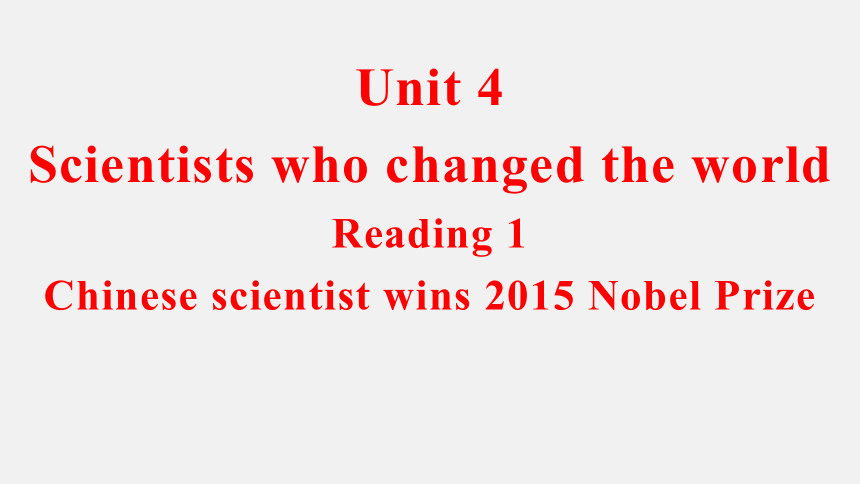
|
|
| 格式 | pptx | ||
| 文件大小 | 5.9MB | ||
| 资源类型 | 教案 | ||
| 版本资源 | 牛津译林版(2019) | ||
| 科目 | 英语 | ||
| 更新时间 | 2024-04-21 10:32:05 | ||
图片预览

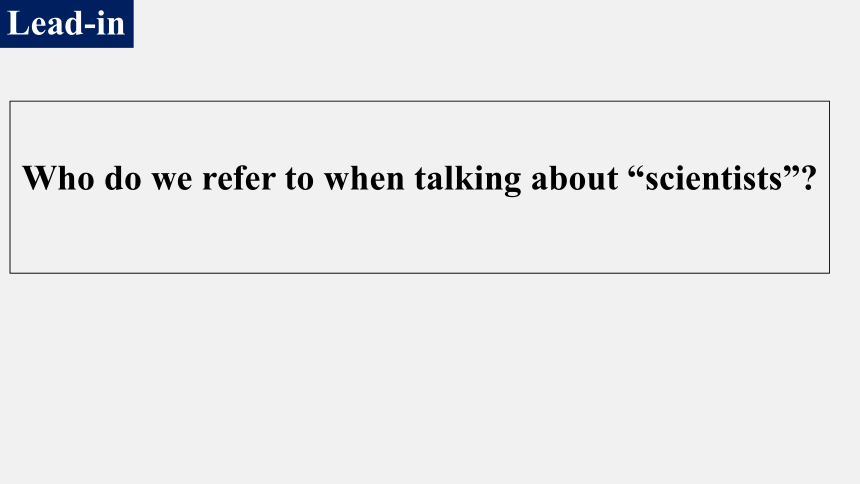
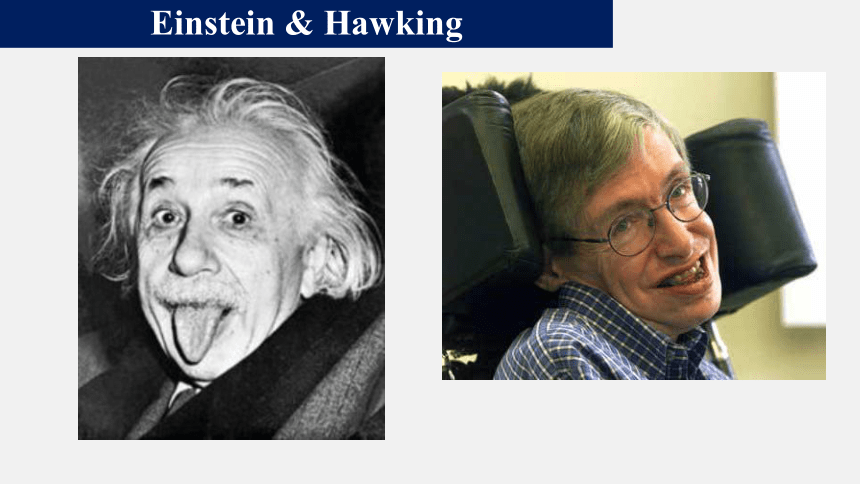
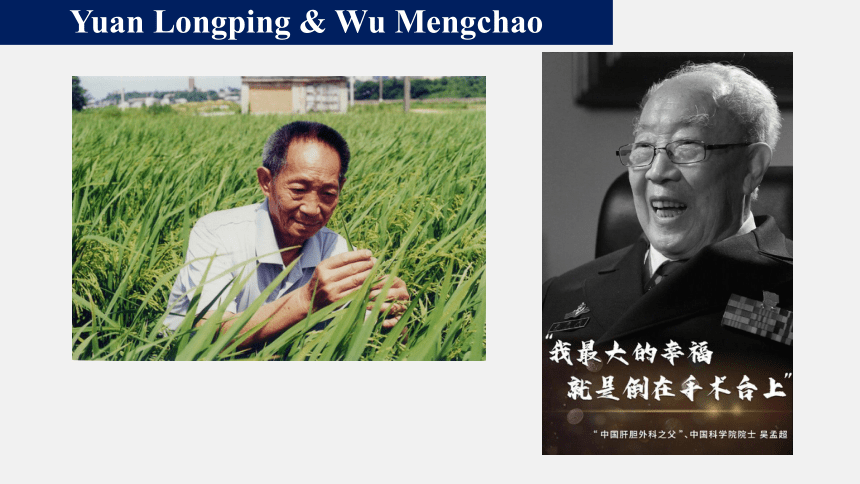
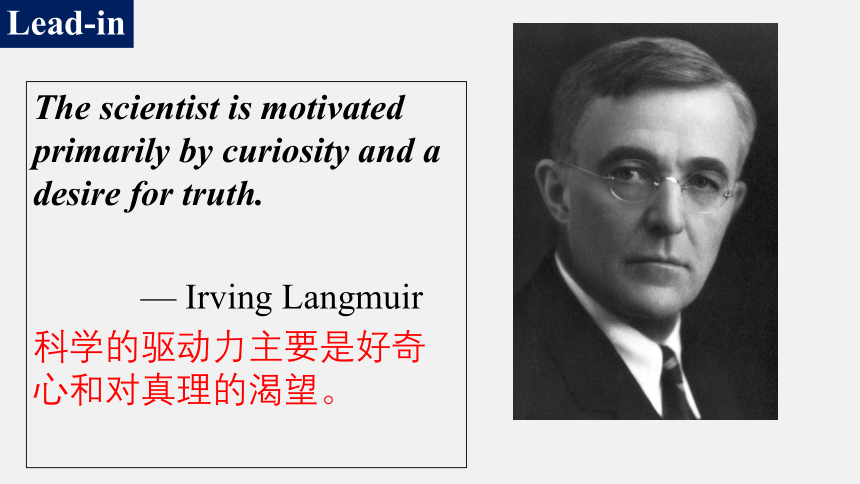
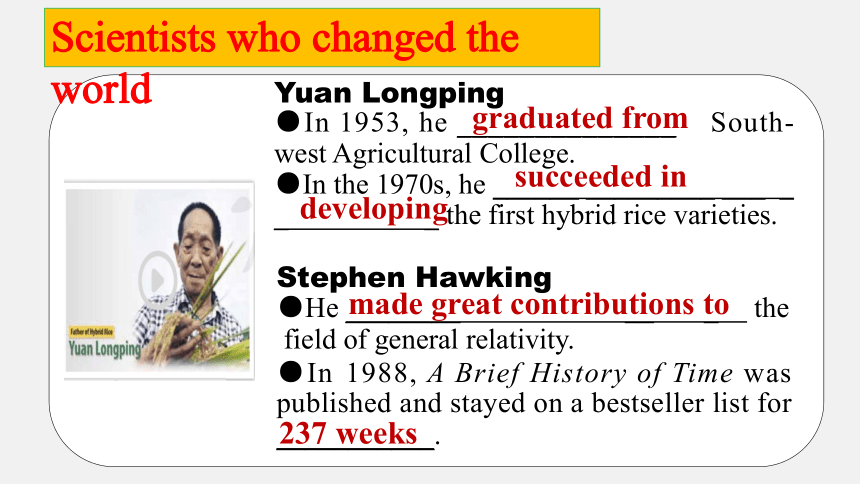
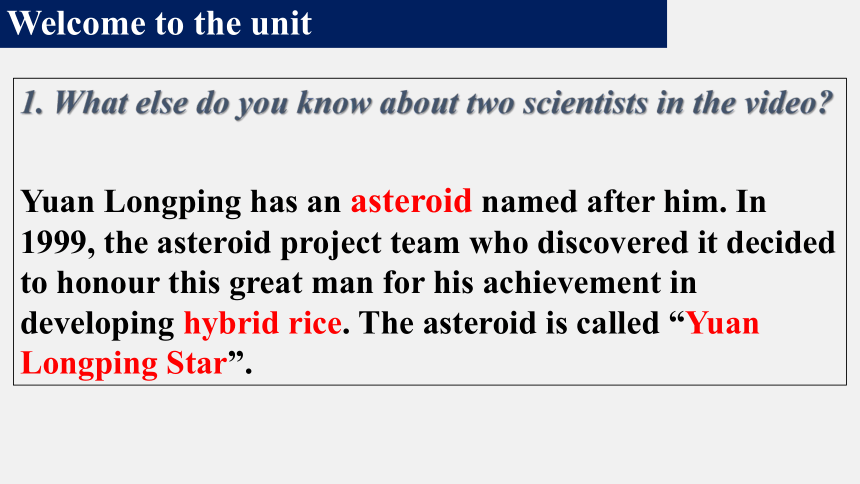
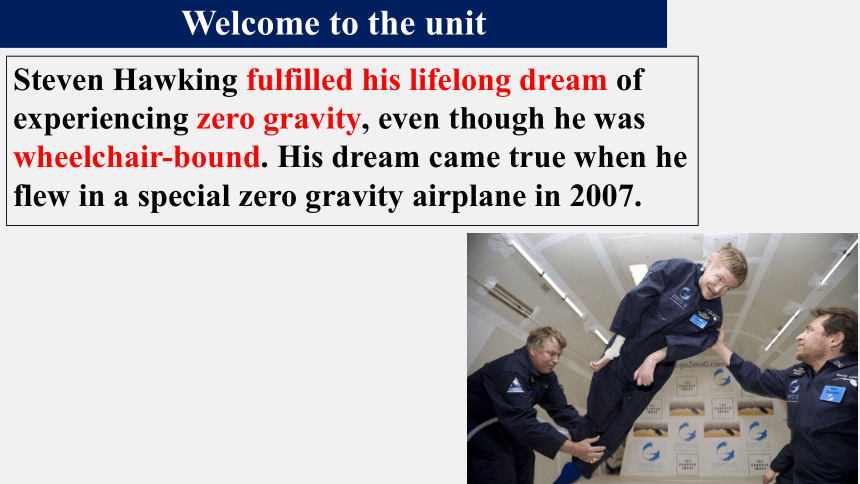
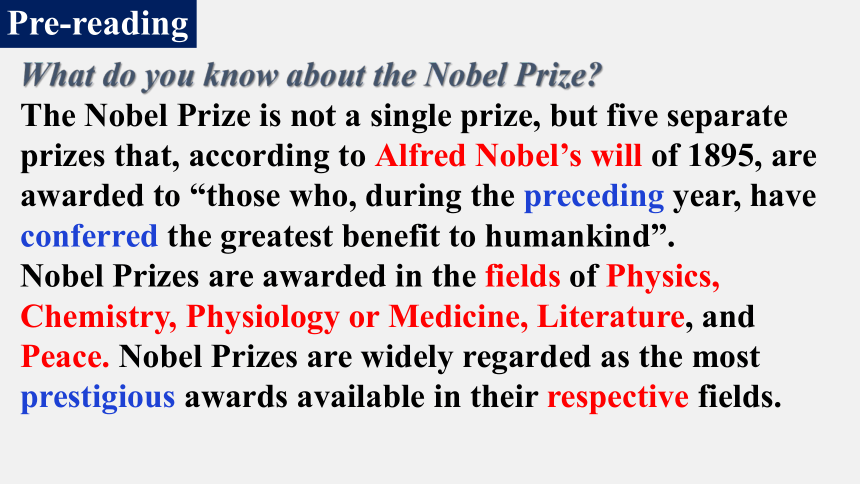
文档简介
(共27张PPT)
Unit 4
Scientists who changed the world
Reading 1
Chinese scientist wins 2015 Nobel Prize
Who do we refer to when talking about “scientists”
Lead-in
Einstein & Hawking
Yuan Longping & Wu Mengchao
Lead-in
The scientist is motivated primarily by curiosity and a desire for truth.
— Irving Langmuir
科学的驱动力主要是好奇心和对真理的渴望。
Yuan Longping
●In 1953, he ______________ South-west Agricultural College.
●In the 1970s, he ______ _________ ___ _ _ _ the first hybrid rice varieties.
Stephen Hawking
●He ________ __ _ the
field of general relativity.
●In 1988, A Brief History of Time was published and stayed on a bestseller list for ___________.
Scientists who changed the world
graduated from
succeeded in
developing
made great contributions to
237 weeks
Welcome to the unit
1. What else do you know about two scientists in the video
Yuan Longping has an asteroid named after him. In 1999, the asteroid project team who discovered it decided to honour this great man for his achievement in developing hybrid rice. The asteroid is called “Yuan Longping Star”.
Welcome to the unit
Steven Hawking fulfilled his lifelong dream of experiencing zero gravity, even though he was wheelchair-bound. His dream came true when he flew in a special zero gravity airplane in 2007.
Pre-reading
What do you know about the Nobel Prize
The Nobel Prize is not a single prize, but five separate prizes that, according to Alfred Nobel’s will of 1895, are awarded to “those who, during the preceding year, have conferred the greatest benefit to humankind”.
Nobel Prizes are awarded in the fields of Physics, Chemistry, Physiology or Medicine, Literature, and Peace. Nobel Prizes are widely regarded as the most prestigious awards available in their respective fields.
Mo Yan winning the Nobel Literature Prize
Chinese scientist wins 2015 Nobel Prize
Who is this winner
Tu Youyou.
Pre-reading
What do you know about Tu Youyou
Nobel Prize winner
Tu Youyou
Well-educated
Strong-minded
Willing to sacrifice
Pre-reading
Chinese scientist wins 2015 Nobel Prize
when, what
who
Headline
News
report
News
report
A1
Para. 1
Tu Youyou won a Nobel Prize in 2015 for her discovery of qinhaosu.
Para. 2
Para. 3–5
Para. 6
Tu Youyou acquired a broad knowledge of both traditional Chinese medicine and Western medicine.
Tu Youyou and her team solved a lot of problems before they successfully discovered qinghaosu.
Tu Youyou and her team’s efforts finally paid off.
While reading
1971
1930
succeeded in making qinghao extract that could treat malaria in mice
1951-1955
1969
1972
2015
born in Ningbo, Zhejiang Province
studied medicine at university in Beijing
became head of a team that intended to find a cure for malaria
successfully discovered qinghaosu
won the Nobel Prize
Tu’s personal experiences
While reading
Problems Solutions
The extracts failed to produce any promising results. Para3
Tu Youyou referred to the ancient books of traditional Chinese medicine again, redesigned the experiments and tried extracting the qinghao herb at a low temperature in order not to damage its effective part.
A2
While reading
Problems Solutions
Tu and her team could not produce enough qinghao extract because research resources were limited.Para4
Tu Youyou and her team managed to find solutions to the problem, e.g. using household water containers instead of research equipment.
While reading
Problems Solutions
Tu and her team did not have sufficient safety data to start trials on patients. Para 5
Tu Youyou and her team volunteered to test the qinghao extract on themselves.
While reading
Reading 短语
stay on a best-seller list保持在畅销书排行榜上
make a difference to 对… 产生影响 P43
1. the first female scientist to receive a Nobel Prize L1
2. be awarded for...因…而被授奖 L3
3. thanks to... 幸亏,由于 L5
4. have a greatly increased chance of..有更大的…机会 L6
5. after graduation 毕业以后 L9
6. acquire a broad knowledge of..获得了广泛的…知识 L11
7. intend to do... 打算/旨在做某事 L14
8. a cure for... …的疗法 L14
9. refer to...查阅,参考,提到 L18
10. in order not to do....为了不做某事 L20
11. succeed in doing sth.=manage to do...成功地做了某事 L21/ L24
12. solutions to the problem 问题的解决方法 L24
13. work day and night夜以继日地工作 L26
14. give up 放弃 L27
15. be likely to do...很可能做某事 L29
16. speed up the process 加快进程 L30
17. volunteer to do...自愿做某事 L31
18. test sth on sb 在…上测试… L31
19. pay off 成功,达到目的,凑效 L32
20. through trial and error 反复试验 L32
21. draw on the wisdom of traditional Chhinese medicine 汲取中医的智慧 L39
22. be benefcial to... 对…有益 L40
Sentences
1. Tu Youyou has become the first female.... L1-5
2. Born in 1930,…,Tu studied medicine at …1955. L8
3.Inspired by an over…,Tu redesigned the experiments and try extracting the herb at a low temperature in order not to damage its effective part. L18
4.Even with large amounts of qinghaosu extract produced, however, they still faced another problem. L28
5.Perhaps the next generation …,drawing on the wisdom of…, will indeed …health care. L38
referred to
pay off
intended
experiments
limited
broad
wisdom
sufficient
B1
point out
make good use of
be intended as
It was not until the 1970s that Tu succeeded in discovering … P47
By then, the fight against ……
Without her broad knowledge ……
B2
Parts of speech Suffixes Words
Adjectives -dom
-ness
wisdom, freedom
effectiveness, usefulness, kindness, loneliness, happiness
Parts of speech Suffixes Words
Verbs -al
-ance
-ure
survival, arrival, approval, proposal,
refusal, removal
appearance, acceptance, performance, assistance
failure, pleasure, exposure, closure
Parts of speech Suffixes Words
Adjectives/Verbs/ Nouns -age
shortage, marriage, passage, percentage
Unit 4
Scientists who changed the world
Reading 1
Chinese scientist wins 2015 Nobel Prize
Who do we refer to when talking about “scientists”
Lead-in
Einstein & Hawking
Yuan Longping & Wu Mengchao
Lead-in
The scientist is motivated primarily by curiosity and a desire for truth.
— Irving Langmuir
科学的驱动力主要是好奇心和对真理的渴望。
Yuan Longping
●In 1953, he ______________ South-west Agricultural College.
●In the 1970s, he ______ _________ ___ _ _ _ the first hybrid rice varieties.
Stephen Hawking
●He ________ __ _ the
field of general relativity.
●In 1988, A Brief History of Time was published and stayed on a bestseller list for ___________.
Scientists who changed the world
graduated from
succeeded in
developing
made great contributions to
237 weeks
Welcome to the unit
1. What else do you know about two scientists in the video
Yuan Longping has an asteroid named after him. In 1999, the asteroid project team who discovered it decided to honour this great man for his achievement in developing hybrid rice. The asteroid is called “Yuan Longping Star”.
Welcome to the unit
Steven Hawking fulfilled his lifelong dream of experiencing zero gravity, even though he was wheelchair-bound. His dream came true when he flew in a special zero gravity airplane in 2007.
Pre-reading
What do you know about the Nobel Prize
The Nobel Prize is not a single prize, but five separate prizes that, according to Alfred Nobel’s will of 1895, are awarded to “those who, during the preceding year, have conferred the greatest benefit to humankind”.
Nobel Prizes are awarded in the fields of Physics, Chemistry, Physiology or Medicine, Literature, and Peace. Nobel Prizes are widely regarded as the most prestigious awards available in their respective fields.
Mo Yan winning the Nobel Literature Prize
Chinese scientist wins 2015 Nobel Prize
Who is this winner
Tu Youyou.
Pre-reading
What do you know about Tu Youyou
Nobel Prize winner
Tu Youyou
Well-educated
Strong-minded
Willing to sacrifice
Pre-reading
Chinese scientist wins 2015 Nobel Prize
when, what
who
Headline
News
report
News
report
A1
Para. 1
Tu Youyou won a Nobel Prize in 2015 for her discovery of qinhaosu.
Para. 2
Para. 3–5
Para. 6
Tu Youyou acquired a broad knowledge of both traditional Chinese medicine and Western medicine.
Tu Youyou and her team solved a lot of problems before they successfully discovered qinghaosu.
Tu Youyou and her team’s efforts finally paid off.
While reading
1971
1930
succeeded in making qinghao extract that could treat malaria in mice
1951-1955
1969
1972
2015
born in Ningbo, Zhejiang Province
studied medicine at university in Beijing
became head of a team that intended to find a cure for malaria
successfully discovered qinghaosu
won the Nobel Prize
Tu’s personal experiences
While reading
Problems Solutions
The extracts failed to produce any promising results. Para3
Tu Youyou referred to the ancient books of traditional Chinese medicine again, redesigned the experiments and tried extracting the qinghao herb at a low temperature in order not to damage its effective part.
A2
While reading
Problems Solutions
Tu and her team could not produce enough qinghao extract because research resources were limited.Para4
Tu Youyou and her team managed to find solutions to the problem, e.g. using household water containers instead of research equipment.
While reading
Problems Solutions
Tu and her team did not have sufficient safety data to start trials on patients. Para 5
Tu Youyou and her team volunteered to test the qinghao extract on themselves.
While reading
Reading 短语
stay on a best-seller list保持在畅销书排行榜上
make a difference to 对… 产生影响 P43
1. the first female scientist to receive a Nobel Prize L1
2. be awarded for...因…而被授奖 L3
3. thanks to... 幸亏,由于 L5
4. have a greatly increased chance of..有更大的…机会 L6
5. after graduation 毕业以后 L9
6. acquire a broad knowledge of..获得了广泛的…知识 L11
7. intend to do... 打算/旨在做某事 L14
8. a cure for... …的疗法 L14
9. refer to...查阅,参考,提到 L18
10. in order not to do....为了不做某事 L20
11. succeed in doing sth.=manage to do...成功地做了某事 L21/ L24
12. solutions to the problem 问题的解决方法 L24
13. work day and night夜以继日地工作 L26
14. give up 放弃 L27
15. be likely to do...很可能做某事 L29
16. speed up the process 加快进程 L30
17. volunteer to do...自愿做某事 L31
18. test sth on sb 在…上测试… L31
19. pay off 成功,达到目的,凑效 L32
20. through trial and error 反复试验 L32
21. draw on the wisdom of traditional Chhinese medicine 汲取中医的智慧 L39
22. be benefcial to... 对…有益 L40
Sentences
1. Tu Youyou has become the first female.... L1-5
2. Born in 1930,…,Tu studied medicine at …1955. L8
3.Inspired by an over…,Tu redesigned the experiments and try extracting the herb at a low temperature in order not to damage its effective part. L18
4.Even with large amounts of qinghaosu extract produced, however, they still faced another problem. L28
5.Perhaps the next generation …,drawing on the wisdom of…, will indeed …health care. L38
referred to
pay off
intended
experiments
limited
broad
wisdom
sufficient
B1
point out
make good use of
be intended as
It was not until the 1970s that Tu succeeded in discovering … P47
By then, the fight against ……
Without her broad knowledge ……
B2
Parts of speech Suffixes Words
Adjectives -dom
-ness
wisdom, freedom
effectiveness, usefulness, kindness, loneliness, happiness
Parts of speech Suffixes Words
Verbs -al
-ance
-ure
survival, arrival, approval, proposal,
refusal, removal
appearance, acceptance, performance, assistance
failure, pleasure, exposure, closure
Parts of speech Suffixes Words
Adjectives/Verbs/ Nouns -age
shortage, marriage, passage, percentage
同课章节目录
- Unit 1 Nature in the balance
- Welcome to the unit
- Reading
- Grammar and usage
- Integrated skills
- Extended reading
- Project
- Unit 2 Natural disasters
- Welcome to the unit
- Reading
- Grammar and usage
- Integrated skills
- Extended reading
- Project
- Unit 3 The world online
- Welcome to the unit
- Reading
- Grammar and usage
- Integrated skills
- Extended reading
- Project
- Unit 4 Scientists who changed the world
- Welcome to the unit
- Reading
- Grammar and usage
- Integrated skills
- Extended reading
- Project
